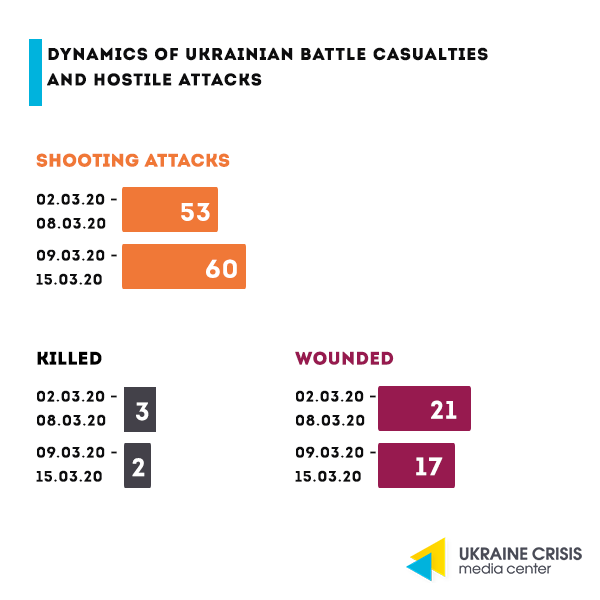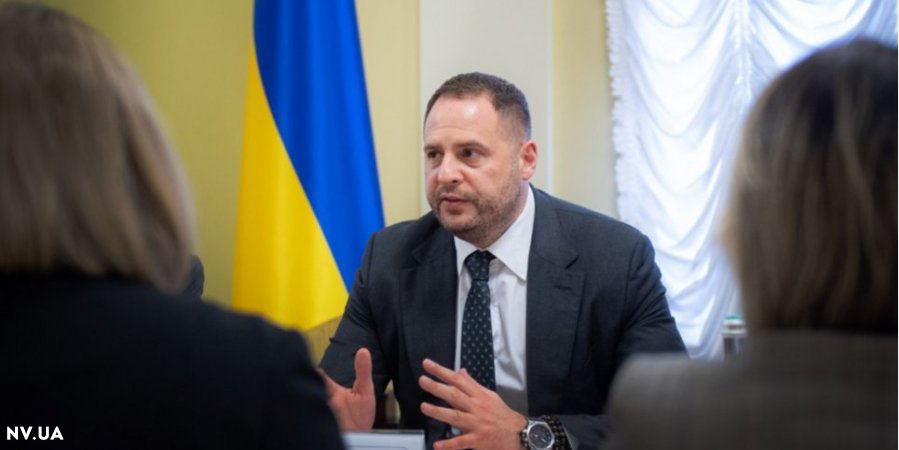Situation in the combat zone.

Last week the situation in the combat zone was tense. On March 9 ignoring the international humanitarian law Russia-backed militants fired upon a medical evacuation vehicle. They used unmanned aerial vehicles to drop two VOG-17 grenades on top of a vehicle bearing Red Cross emblems.
On March 10 near the disengagement site no.3 Bohdanivka – Petrivske Russia’s proxies conducted harassing fire three times using automatic grenade launchers and small arms. Ukraine’s Joint Forces did not return fire respecting the ceasefire.
Kyiv being dragged into a direct dialogue with “L/DPR”

Last week the Ukrainian society got alarmed at the news coming from Minsk. The documents that were publicly released show official Kyiv standing one step away from consenting to a direct dialogue with the so-called “L/DPR”.
What happened? On March 11, 2020 minutes of a sitting of the Trilateral Contact Group and the decision to establish the Consultation Council were signed in Minsk. According to the documents the parties agreed to create a joint platform for a direct dialogue between Ukraine and representatives of the defined (occupied) districts of Donetsk and Luhansk regions.
The Consultation Council will be taking part in drafting the decisions on the most disputable political points of the Minsk documents that include elections in the occupied Donbas, the law on the “special status” of Donbas that will stay in force permanently and the changes to the Constitution. It will all fall within the scope of action of the Consultation Council.
As per the text of the decision, the Council will comprise 24 members. Twenty of them will have the right to vote: 10 representatives of Ukraine and 10 of the “ORDLO”. The remaining four members will have an advisory role representing Russia, OSCE, Germany and France.
What are the risks?The composition of the Consultation Council is the first problem. This new format preliminary endorsed by Kyiv is different from the format of the Trilateral Contact Group or from that of the “Minsk talks”.
Negotiations in Minsk have only three parties: Ukraine, Russia and OSCE as a mediator. The word “Trilateral” in this group’s name means it has no other parties. Instead the militants backed by Russia are present in Minsk as “monitors” and have no right to vote (their voice is always eagerly represented by Russia).
Throughout all years of the conflict it has been key to Ukraine. President Zelenskyi has continuously stated that he rules out a direct dialogue with militants of the so-called “L/DPR”.
Meanwhile if the Consultation Council is established this principle will be violated.
Main risk of the decision is that, according to the documents, members of “ORDLO” will be represented as a sovereign party while it’s Russia that is the aggressor and the party to the conflict in Ukraine.
The step may well become the point of no return in the Russian-Ukrainian conflict. The day and the place when the “red line” will be crossed are already set. It is to happen on March 25 at the meeting of the Trilateral Contact Group in Minsk. The draft to be signed there has been already agreed.
Against the Constitution and the law. A step towards recognizing the sovereignty of the occupied territories is against the Constitution and the law of Ukraine. According to the Law of Ukraine “On the state policy to ensure the state sovereignty of Ukraine in the temporarily occupied territories in Donetsk and Luhansk regions” no.2268 of 2018, the Russian Federation is exercising temporary occupation of Ukraine’s territory in Donetsk and Luhansk regions.
Thus, under the Ukrainian legislation it is not possible to give recognition in whatever form to any “authority” by the so-called “LPR” and “DPR”. Negotiations set to ensure the rights and interests of Ukrainian citizens in the temporarily occupied territory of Ukraine and to stop Russia’s military aggression against Ukraine are to be held exclusively with the Russian Federation and its representatives with mediation by international partners.
Politics precedes security in Minsk, yet again. After the Minsk Protocol was signed it has been paramount to Ukraine that security comes ahead of politics. First Russia stops its military aggression and adheres to the ceasefire, then there is a chance for political settlement. Instead present negotiations are headed towards the attempts of Ukraine to give in politically before security issues are settled. The powers of the Consultation Council can become a big problem. Head of the Office of the President Andriy Yermak publicly said that his intention is to implement the paragraphs of “Minsk” that bind Ukraine to agree the future law on elections and the upcoming amendments to the Constitution (paragraphs no. 9, 11 and 12 of the “Minsk-2”) “with representatives of ‘ORDLO’”.
With the number of votes that militants will be holding in the Consultation Council they will be able to block decisions, unless they agree nothing can be approved (3/4 of votes is required to pass a decision). Thus, instead of an advisory body the Council can turn into the key platform where practical solutions will be drafted, while the political subgroup (where the Council is being actually created) will be just formally approving its suggestions.
What’s crucial is that these new developments say nothing about security or Russia disrespecting the commitments it took including the ones at the Normandy Four summit in Paris. In the situation when the combat situation has been escalating over the past weeks and hostile attacks take place even at disengagement sites, a decision like that is very dangerous.
Political opponents criticize the decision. Petro Poroshenko. The President of Ukraine Volodymyr Zelenskyi has to explain which directives the Head of the Office of the President Andriy Yermak based on when signing the minutes of the Trilateral Contact Group meeting of March 11, 2020, said the fifth President of Ukraine and party leader of “European Solidarity” (Yevropeiska Solidarnist) Petro Poroshenko. “Establishing consultation councils with Russian puppets is exactly the way towards gradual capitulation. The reason behind the statements on rejecting the course towards NATO membership and on restoring water supply in the occupied Crimea is becoming clear. It is what the Kremlin wants. Implementing similar initiatives is equal to treason, responsibility for it is stipulated by the Criminal Code,” Poroshenko emphasized in a statement released by “European Solidarity” party.
PositionofYuliaTymoshenko’sparty. Chief of the “Batkivshyna” (Fatherland) party Yulia Tymoshenko is convinced that in course of negotiations with Russia the team of President Zelenskyi is signing the documents that contradict Ukraine’s national interests. “My position has been clear and unambiguous. There is no internal conflict in Ukraine. There is Russia’s war against Ukraine in Donbas. There is Russia’s occupation of Crimea. Instead the documents that were signed declare the inexistent ‘civil war’. Peace settlement cannot contain even a hint on capitulation!” Tymoshenko is quoted in a statement released by her party’s press service.
“Servant of the People” party splits over the decision. A group of MPs of the “Servant of the People” (Sluha Narodu) faction addressed President Zelenskyi asking him not to let establish the Consultation Council within the political subgroup of the Trilateral Contact Group in Minsk.
The address was signed by 60 MPs of the faction. The lawmakers insist that it contradicts the legal definition of the Russian aggression in Ukraine.
“In this regard we are appealing to the President of Ukraine Volodymyr Zelenskyi. In circumstances of controversial public reaction on the latest initiatives in Minsk, we see the need that Ukraine’s representatives to the Trilateral Contact Group as well as all Ukraine’s negotiators are ordered to come back into the legal framework of Ukraine. What’s needed is not to let implement the decisions establishing the Consultation Council in ways and forms that find no support by the people of Ukraine, contradict the law and national interests,” the address reads.
How does Ukraine respond to COVID-19?

Ukraine now has one confirmed death from coronavirus but the government implemented already harsh restrictions. All schools and universities are closed, mass gatherings are halted. Ukraine’s Security and Defense Council is suspending international flights and is introducing a temporary restriction on entry to foreign nationals. Municipal authorities in Kyiv and in other big cities have ordered that all venues but food shops, pharmacies and hospitals are closed effective March 17.
Follow live updateson Ukraine’s response to COVID-19 posted by “Ukraine World”.





